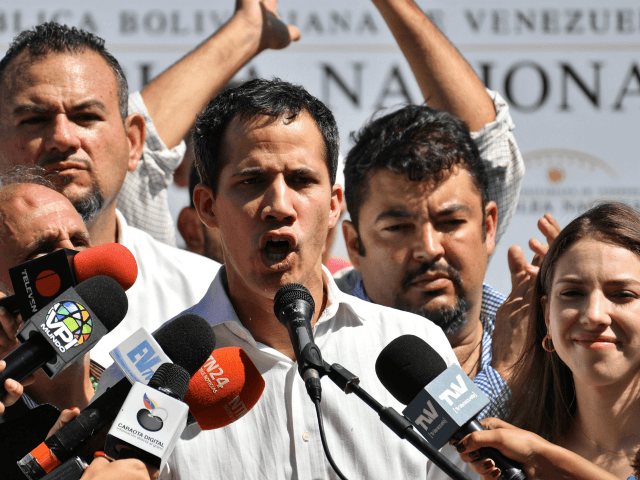Members of Venezuela’s National Bolivarian Intelligence Agency (Sebin), the nation’s secret police, arrested National Assembly President Juan Guaidó on Sunday on the way to a rally in Vargas state, which he represents in the legitimate legislator.
The Sebin agents released him shortly after ambushing his vehicle on a major highway. Nicolás Maduro’s government has not provided an explanation for the arrest and high-ranking officials claimed to have no knowledge of the incident.
The opposition-controlled National Assembly, which Maduro illegally disabled and replaced with an unconstitutional body called the “national constituents’ assembly” (ANC) in 2017, elected the 35-year-old Guaidó its president last week. Guaidó is a member of the opposition Popular Will party, which boasts membership in the Socialist International but rejects the legitimacy of Maduro’s United Socialist Party of Venezuela (PSUV).
Members of the Venezuelan opposition began circulating video of Guaidó’s highway arrest on Twitter on Sunday.
“With large weapons and masks, they opened the SUV and forced him to get out, they didn’t beat him, but they told us that they needed to take him away immediately,” wife Fabiana Rosales confirmed shortly after the incident.
The arrests triggered a national outcry among members of Venezuela’s opposition, demanding to know Guaido’s whereabouts and health status. Guaidó’s official Twitter account announced that “a commando of the Sebin intercepted the President of the National Assembly of Venezuela and we do not know his whereabouts.”
Prior to the arrest, Guaidó used his capacity as president of the legislature to decree Maduro an illegitimate president. Maduro “won” the presidency last year in an election in which non-socialist opposition candidates were banned from running and Venezuelan’s marked a record low turnout to vote. Widespread allegations of fraud at the ballot boxes also surfaced, resulting in most of Latin America refusing to recognize Maduro’s “inauguration” last week.
“We reaffirm the illegitimacy of Nicolás Maduro … from January 10 on he will be usurping the presidency and as a consequence, this National Assembly is the only legitimate representative of the people,” Guaidó declared on January 5.
Guaidó’s disappearance ended shortly after his arrest and, within a few hours, he had arrived in Vargas to deliver the speech he had planned on this Sunday.
“What happened today, there are probably a lot of places in the country that don’t know about it,” he told the audience. “We know the problem with social media,” he added, accusing the government of silencing dissident voices online.
“I ask you to do this task for me today … send a message: the end of usurpation, a transition government, and free elections,” he demanded.
Returning to social media, Guaidó urged followers to make bigger news of the humanitarian disaster that Venezuela lives today than of his arrest.
“What happened today will not make us forget that yesterday, a hospital spent more than 5 hours without electricity, a mother had no food to feed her child. Before this crisis we will remain at the vanguard of this struggle until we restore the constitutional order,” he wrote.
Maduro’s government responded to outrage against Guaidó’s temporary arrest with confusion. Communications Minister Jorge Rodríguez appeared to implicate the opposition itself in the incident, calling the arrest a “show” and “false positive” put together to embarrass the regime.
“A group of officials acting unilaterally executed a procedure irregularly against the deputy,” Rodríguez said. “These officials offered themselves to be part of this show. They have been removed from their positions and are being subject to the strictest disciplinary action.”
Guaidó took office this month despite Maduro decreeing that the National Assembly no longer legally existed, a move that the Venezuelan Constitution does not grant him the power to make. Instead, Maduro gifted the ANC that power, ensuring that seats in that legislature went to trusted allies like son “Nicolásito” Maduro Guerra and First Lady Cilia Flores. The National Assembly has nonetheless continued to function and urge world powers to acknowledge its legitimacy over the ANC, which many of Latin America’s states have done.

COMMENTS
Please let us know if you're having issues with commenting.